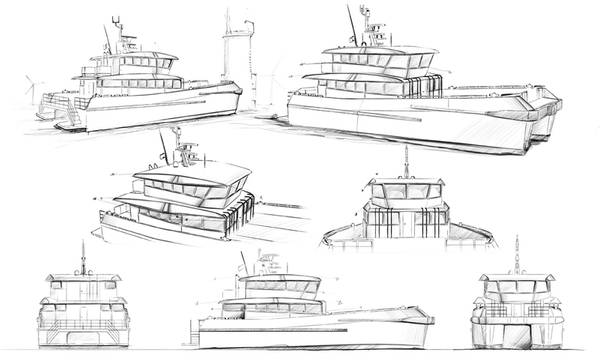
Chartwell Marine announced the launch of the Chartwell 24, a brand-new crew transfer vessel (CTV) design for the international offshore wind markets. The catamaran design has been developed in conjunction with CTV operators, wind farm owners and turbine manufacturers, responding directly to lessons learnt in the construction and long-term operations & maintenance (O&M) phases of European projects.
CTVs continue to play a critical role throughout development and operations. This role has evolved in line with the increasing demands of supporting large-scale deep-water wind farms, encompassing not only the safe, comfortable and expedient transfer of technicians to and from the turbines, but also a wide range of essential logistical support activities that keep a project running on schedule.
In this context, CTVs and their operators must offer considerable versatility, while maintaining the highest possible standards of safety and technical availability. As the industry looks to balance these objectives, vessel designs are becoming increasingly standardized – but there is still room to refine this formula. In turn, operators in new markets such as the U.S. and Taiwan have the opportunity to start on the front foot by taking advantage of the most advanced vessel technology available.
The Chartwell 24, developed off the back of 10 years of data and experience in offshore wind vessel design, aims to hit a ‘sweet spot’ in vessel size and capability that has been achieved by the most effective vessels currently operating in the European market, the designer said. It aims to build on those proven capabilities, while responding to new requirements emerging as the offshore wind industry expands worldwide.
Specifically, the vessel, which is capable of carrying 24 industrial personnel alongside 3-6 crew, also boasts the largest CTV foredeck in the market, enhancing its cargo capacity. With four engines – and options for hybrid propulsion – the Chartwell 24 enables power sharing, enhancing efficiency and adding redundancy that maximizes vessel reliability and availability. As scrutiny grows on vessel emissions worldwide, this also means that the vessel is well-placed to meet international requirements, such as EPA Tier 4 and IMO Tier 3.
Crucially, the Chartwell 24 introduces a number of safety related innovations, including a step-free deck that almost entirely eliminates trip hazards, and purpose designed walkways with handrails and sliding safety rails positioned for safe, effective and repeatable crew transfer. From an operational perspective, skippers benefit from full all-round visibility, uncompromised by deck cargo.
“With the Chartwell 24, we’re responding directly to tried and tested vessel support approaches adopted throughout Europe, taking and building upon the best of proven designs and equipping international operators and wind farm owners with a boat that is built for purpose, and meets their needs from day one,” said Andy Page, Managing Director, Chartwell Marine.
“For crews and wind farm technicians, that will translate into a high degree of safety, comfort and operational familiarity. For CTV operators and project owners, that will result in incremental gains in efficiency, availability and reliability that ultimately improve the way offshore wind farms are constructed and operated.”